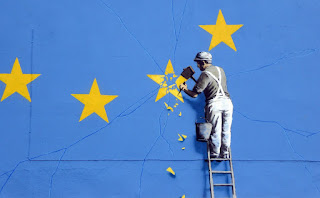‘Grassroots’ organisations can make a difference. Brexpats
– Hear Our Voice (BHOV) won a European Union award relating to their
campaigning involving cross-border cooperation and ‘’concrete expression to the
values enshrined in the Charter of Fundamental Rights in the European Union’’.
From tiny acorns mighty oaks grow.
Brexpats – Hear Our
Voice (BHOV) is not ‘just an
anti-Brexit’ group. Rather it seeks that the EU, and the UK Government,
maintain the rights of the millions of British citizens currently living in
other EU countries and also the rights of the millions of EU citizens currently
living in the UK. They have done much and achieved much.
July 2016
The group as a collective wrote and distributed a letter to
all politicians in the UK and the EU Parliaments and some media outlets,
raising the concerns of EU Nationals living in the UK and UK Citizens living in
the EU post the Referendum Result.
Lord Berkeley raised the letter in a debate in the House of Lords (watch the video)
The letter was posted on the Lords of the blog site
The letter was posted on the Lords of the blog site
August 2016
The original letter was redistributed (shortened and
slightly adapted) to all recipients as stated above but also the new DexEU,
Cabinet Ministers and some EU Commissioners’.
Some great responses
from UK and EU MEPs, significantly Jean Lambert MEP.
Replies from some
Cabinet Ministers and one from an EU Commissioner
September 2016
Written evidence was submitted to the British Future inquiry
and their report.
An invite to speak in person
with Jean Lambert MEP at the EP was received and conducted. A very productive
meeting ensued, which resulted in a continuing relationship.
October 2016
An invite received
(and accepted) from Jean Lambert MEP to speak at a Forum on Freedom of Movement
in London on 11th November 2016.
Freedom of movement from Jean Lambert MEP on Vimeo.
November 2016
Brexpats attended and presented at the Green Party Forum the
Freedom of Movement Research.
December 2016
BHOV assigned a ‘petitions
coordinator ‘ who led the promotion of such.
Some of the petitions
broke the 10,000-signature mark .
January 2017
BHOV signed “the Pledge” for the 3 million.
This was handed to
the Prime Minister’s Office and coverage by many media outlets was gained.
‘Concerted Plea’ video completed and distributed to all
politicians.
The House of Commons Select Committee for exiting the EU
inquiry was held in London.
BHOV were part of the oral evidence session.
February 2017
The group was a co signatory, involved in providing feedback
and distribution of the "Alternative White Paper"
March 2017
 |
| March 25 2017 in London |
The group
collaborated with RIFT on their written evidence (BMP0011) to the House LORDS -
European Union Committee - 14th Report of Session 2016–17
April 2017
Joint evidence with Remain
in France Together (RIFT) was submitted
to the House of Commons Procedure Committee inquiry into “Delegated powers and
the Great Repeal Bill”.
As part of The Coalition of UK groups “British in Europe”,
BHOV met with the Department for Exiting the EU twice.
They met and spoke at
a forum in London with the EU President Tajani.
Brexpats – Hear our
Voice (BHOV) campaigning and
influence will continue. They work in coordination with ‘sister’ organisations
RIFT and Bremain in Spain. BHOV has made a difference; we can all make a
difference, so never give up on supporting your EU ideals.
To find out about Brexpats – Hear our Voice , and how you can help, visit their website brexpatshov.com
UPDATE: the BHOV founder has started a Facebook group British in the Netherlands for UK citizens, whom are concerned about their future rights, where they can share worries, share information and form a lobbying unit.
















